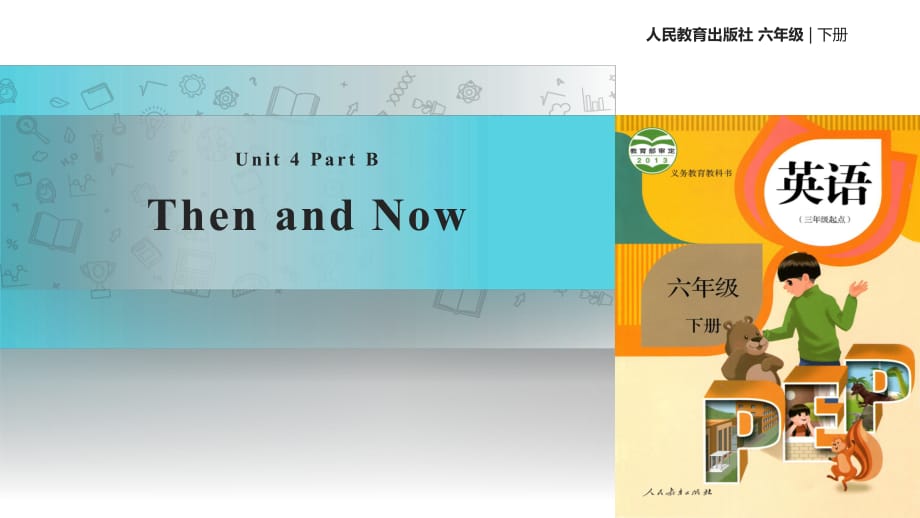《六年級(jí)下冊(cè)英語課件- Unit4 Then and nowPart B 課時(shí)1∣人教》由會(huì)員分享����,可在線閱讀,更多相關(guān)《六年級(jí)下冊(cè)英語課件- Unit4 Then and nowPart B 課時(shí)1∣人教(27頁珍藏版)》請(qǐng)?jiān)谘b配圖網(wǎng)上搜索����。
1、人民教育出版社 六年級(jí) | 下冊(cè) Unit 4 Part B Then and Now 人民教育出版社 六年級(jí) | 下冊(cè) 第一課時(shí)P36-37 人民教育出版社 六年級(jí) | 下冊(cè) 復(fù)習(xí)舊課 1. There _ a clock on the table. A. was B. were 2. _ there a map on the wall? Yes, there _. A. Are / is B. Is / are C. Is / is D. Are /are 3. There _ some students in the classroom. A. are B. is 4. There _
2����、a pencil, a book and two pens on the table. A.was B. are 人民教育出版社 六年級(jí) | 下冊(cè) 5. There _ two apples, one orange and one banana on the table. A. is B. are 6. Are there _ pictures on the wall? No, there arent _ . A. any / any B. some / any C. some / some D. any/some7. There isnt a book in his hand. There
3����、is _ book in his hand. A. no B. not 8. - Are there _ shops near here? - No, there are _ shops near here. A. some, not B. some, any C. any, not D. any, no 人民教育出版社 六年級(jí) | 下冊(cè) 人民教育出版社 六年級(jí) | 下冊(cè) Lets tryMikes friends are visiting his home. Listen and circle. 1.What are they talking about? A. Mikes hobby. B
4����、. Mikes old photos.2. What grade was Mike in? A. Grade 1. B. Grade 5.講授新知識(shí) 人民教育出版社 六年級(jí) | 下冊(cè) Chen Jie: John, come and look at Mikes old photos! John: Thats funny, Mike! Youre wearing a pink T-shirt. Mike: Yes, but I dont like pink now. Chen Jie: We are all different now! Mike: Right. Before, I was qu
5����、iet. Now, Im very active in class. How about you? John: Well, I was short, so I couldnt ride my bike well. Now, I go cycling every day. I like it very much. Chen Jie: Thats good exercise. How did Mike change? Lets talk 人民教育出版社 六年級(jí) | 下冊(cè) How did Mike change? Before he liked pink, but now he doesnt lik
6、e pink. Before, he was quiet, but now he is very active in class. 人民教育出版社 六年級(jí) | 下冊(cè) Find the clueChen Jie: John, come and look at Mikes old photos! John: Thats funny, Mike! Youre wearing a pink T-shirt. Mike: Yes, but I dont like pink now. Chen Jie: We are all different now! Mike: Right. Before, I wa
7����、s quiet. Now, Im very active in class. How about you? John: Well, I was short, so I couldnt ride my bike well. Now, I go cycling every day. I like it very much. Chen Jie: Thats good exercise. How did Mike change? 人民教育出版社 六年級(jí) | 下冊(cè) Solve the difficultyall既可以做代詞����,也可以做副詞����,意為“全部����,全體,大家����,整個(gè)”����。We all like playi
8、ng football.All of us dont like maths. 人民教育出版社 六年級(jí) | 下冊(cè) wearwear表“穿”����,可以使用現(xiàn)在進(jìn)行時(shí)����,表示“穿著”����。Hes wearing a blue T-shirts.Shes wearing a pair of pink shoes. 人民教育出版社 六年級(jí) | 下冊(cè) activeAdj. 活躍的����,積極的;陽性的Hes active in the company.He hasnt got an active result. 人民教育出版社 六年級(jí) | 下冊(cè) go cycling= ride a bike 人民教育出版社 六年級(jí) |
9����、下冊(cè) 人民教育出版社 六年級(jí) | 下冊(cè) 鞏固運(yùn)用 How about now?I didnt like winter before. I thought it was too cold, and I couldnt go cycling. Now I love to ice-skate, so I like winter. 人民教育出版社 六年級(jí) | 下冊(cè) 英語中How about����?是一個(gè)常用語句,它后面可接名詞����、代詞或動(dòng)詞-ing形式,注意接人稱代詞時(shí)需用賓格形式����,具體用法如下:How about ?的 用 法 人民教育出版社 六年級(jí) | 下冊(cè) 當(dāng)對(duì)方談?wù)摰氖虑椴幻鞔_����,需要詢問清楚時(shí)����,可用這
10����、一句型����。例如:I like English. How about you?我喜歡英語����。你呢����? 人民教育出版社 六年級(jí) | 下冊(cè) 向?qū)Ψ教岢鼋ㄗh或請(qǐng)求����,相當(dāng)于句型“Would you like����?”����,語氣很委婉����。例如:How about having some noodles?=Would you like some noodles?吃些面條怎么樣����? 人民教育出版社 六年級(jí) | 下冊(cè) go cycling ice-skate play badminton 人民教育出版社 六年級(jí) | 下冊(cè) Listen, match and sayBefore, Allen couldnt Now 人民教育出版社
11����、六年級(jí) | 下冊(cè) I can sayBefore, Allen couldnt ride his bike well. Now he goes cycling every weekend. Before, Diana couldnt play badminton .Now she plays badminton every week.Before, Joe couldnt ice-skate. Now he goes ice-skating every winter. 人民教育出版社 六年級(jí) | 下冊(cè) 檢查評(píng)價(jià) 選詞填空different quiet active cycling exerci
12����、se1.You should do more _.2. We will go _.3. I have a _ answer.4. Alice is _ . She likes reading.5. Mike is _. He likes sports.exercisecycling different quiet active 人民教育出版社 六年級(jí) | 下冊(cè) 1. They are playing_ volleyball. A. a B. the C. /2. How about _ football? A. play B.playing C. to play3.Mike _ swimmin
13����、g. A. like B.love C. loves選 擇 人民教育出版社 六年級(jí) | 下冊(cè) 間隔性復(fù)習(xí) 時(shí)態(tài)一般現(xiàn)在時(shí):一般過去時(shí):經(jīng)?���;蛄?xí)慣性的動(dòng)作或存在的狀態(tài)����。過去某個(gè)時(shí)間或時(shí)間段發(fā)生的動(dòng)作或存在的狀態(tài)。(The Simple Present Tense)(The Simple Past Tense) 人民教育出版社 六年級(jí) | 下冊(cè) 動(dòng)詞第三人稱單數(shù)的構(gòu)成:過去式的構(gòu)成: 直接加-s����。以s, x, ch, sh, o結(jié)尾加-es。以“輔音+y “結(jié)尾變y 為i再加-es����。直接加-ed。以e結(jié)尾只加d。重讀輔元輔����,雙寫尾字母再加-ed。以“輔音+y”結(jié)尾變y 為i 再加-ed����。 人民教育出版社 六年級(jí) | 下冊(cè) 1.將所學(xué)新單詞抄寫在四線三格里����,并將Lets learn版塊錄音讀給家長(zhǎng)聽����。2.寫一寫自己學(xué)校今昔對(duì)比����。 謝謝觀看!
 六年級(jí)下冊(cè)英語課件- Unit4 Then and nowPart B 課時(shí)1∣人教
六年級(jí)下冊(cè)英語課件- Unit4 Then and nowPart B 課時(shí)1∣人教

